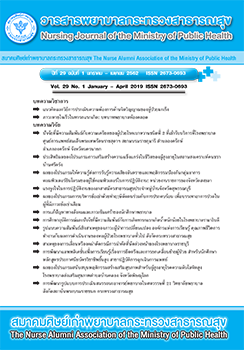Factors Correlated with Stress of Patients with Diabetes Mellitus Type 2 in Princess Maha Chakri Sirindhorn Medical Center, Ongkharak, Nakhonnayok Province
Main Article Content
Abstract
This study was conducted to investigate the factors correlated with stress among patients with diabetes mellitus type 2. A cross-sectional descriptive design was used in this study. A convenience sampling technique was used to recruit 163 Diabetes Mellitus type 2 patients from the outpatient department of HRH Princess Maha Chakri Sirindhorn Medical Center, Ongkharak, Nakhonnayok Province. The tools used for data collection included 1) a questionnaire regarding general information about diabetes, 2) a Diabetic coping behaviors questionnaire, and 3) a Self-analysis stress test evaluation questionnaire. Data analysis was carried out using the SPSS program to obtain the frequency, percentage, Pearson correlation coefficient and spearman rank correlation coefficient. The main findings found that more than half of the respondents had a normal level of stress coping (57.1%) and low stress (55.8%). Factors that affect the level of stress were: 1) blood sugar has positive significant correlation with stress (rp=.16, p=.04), which means that the blood glucose level varies with the stress level, 2) coping has negative significant correlation with stress (rs=-.24, p=.01), which means coping with stress was inversely related with stress level. The results of this study can be used as basic information for the design and development of programs to solve stress problems in diabetic patients. The emphasis should be on the importance of reducing blood sugar levels and further enhancing patients’ ability to cope with stress.
Article Details
บทความและรายงานวิจัยในวารสารพยาบาลกระทรวงสาธารณสุข เป็นความคิดเห็นของ ผู้เขียน มิใช่ของคณะผู้จัดทำ และมิใช่ความรับผิดชอบของสมาคมศิษย์เก่าพยาบาลกระทรวงสาธารณสุข ซึ่งสามารถนำไปอ้างอิงได้
References
2. Aekplakorn W. Thai National Health Examination Survey, NHES. 4thed. Nonthaburi: The Graphico System; 2010. (in Thai).
3. Aekplakorn W. Thai National Health Examination Survey, NHES. 5th ed. Nonthaburi: The Graphico System; 2016. (in Thai).
4. Diabetes Association of Thailand. Guidelines for the treatment of diabetes 2017. Pathum Thani: Romyen Media; 2017. (in Thai).
5. Egede LE, Ellis C. Diabetes and depression: global perspectives. Diabetes Research and Clinical Practice 2010;87(3):302-12.
6. Suppaso P. The prevalence of depression among type2 diabetic patients in Phangkhon hospital. Srinagarind Medical Journal 2010; 25:272-9.
7. Rungreangkulkij S, Thavornpitak Y, Kittiwatanapaisan W, Kotnara I, Kaewjanta N. Prevalence and factors of depression among Type 2 diabetic patients. Journal of The Psychiatric Association of 8. Thailand 2014; 59(3): 287-98. (in Thai)
8. Chanapa P, Kijkuokool P. Stress and the metabolic syndrome. Songklanagarind Medical Journal 2013;31(5):253-60. (in Thai).
9. Pethchit R. Self-care behaviors and blood sugar control among patients with diabetes mellitus at Khiensa Hospital, Suratthani Province. The Southern College Network Journal of Nursing and Public Health 2015; 2(2): 15-28. (in Thai).
10. Wirojratana V, Leelahakul V, Khumtaveeporn P, Watthana P. Health promoting behaviors and health risks of the elderly in the Health Promotion Center at Faculty of Nursing, Mahidol University. Thai Journal of Nursing Council 2011;26 Suppl:140-53. (in Thai).
11. Peapak K, Monsil N. Study of stress and stress management of diabetic patient Baanchaichana Tambon Health Promotion Hospital, Amphoe Song Dao, Sakon Nakhon Province [Internet]. 2013 [cited 2016 January 10]. Available from: http://www.skko.moph.go.th/dward/document_file/perdev/research_file_name/20131106133618_420299681.pdf. (in Thai).
12. Sulukananuruk C, Jaisanook W, Muktabhant M. Association of depression and stress with HbA1c level of type 2 diabetic patients attending the diabetes clinic of Nampong Hospital, Khon Kaen Province. Srinagarind Medical Journal 2016;31(1):34-46. (in Thai).
13. Yodkaew P, Ruchiwit M. The relationship between stress and coping methods of diabetic patients with cataract complications before operation. Thammasat Thai Journal of Ophthalmology 2010;5(1):49-58. (in Thai).
14. Wanlaoo S, Malathum P, Siripitayakunkit A. Family support perceived by older persons with controlled type 2 diabetes. Ramathibodi Nursing Journal 2012;18(3):372-88. (in Thai).
15. Lazarus RS, Folkman S. Stress, appraisal, and coping. New York: Springer Publishing; 1984.
16. Department of Mental Health, Ministry of Public Health. Self-analysis stress test evaluation Nonthaburi: Department of Mental Health [Internet]. 2010 [cited 2016 January 10]. Available from: https://www.dmh.go.th/ebook/view.asp?id=134. (in Thai).
17. Singchongchai P. Principles and using multivariate statistics analysis for nursing research. 3rd ed. Songkhla: Chanmuang Printing; 2006. (in Thai).
18. Nefs G, Pouwer F, Denollet J, Pop V. The course of depressive symptoms in primary care patients with type 2 diabetes: results from the Diabetes, Depression, Type D Personality Zuidoost-Brabant (DiaDDZoB) Study. Diabetologia 2012;55(3):608-16
